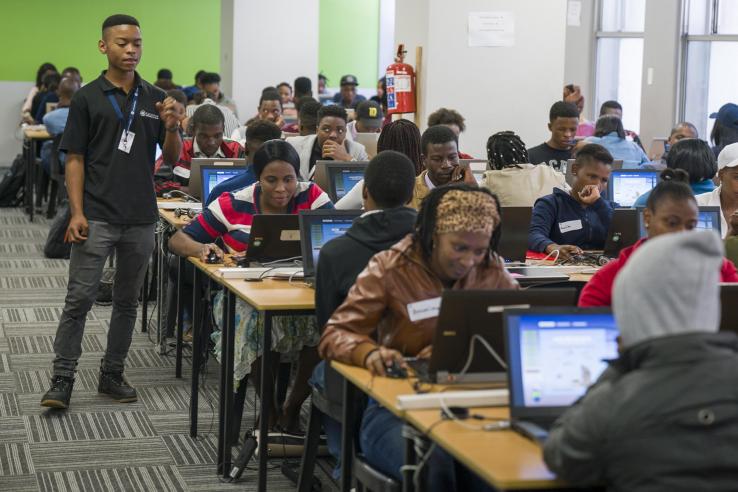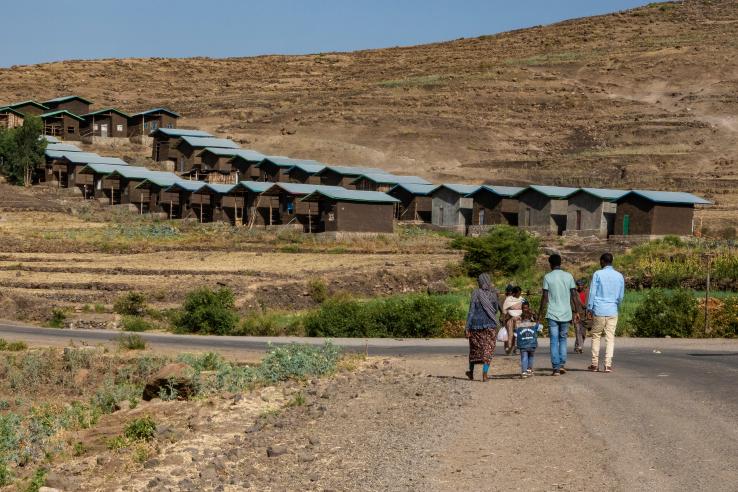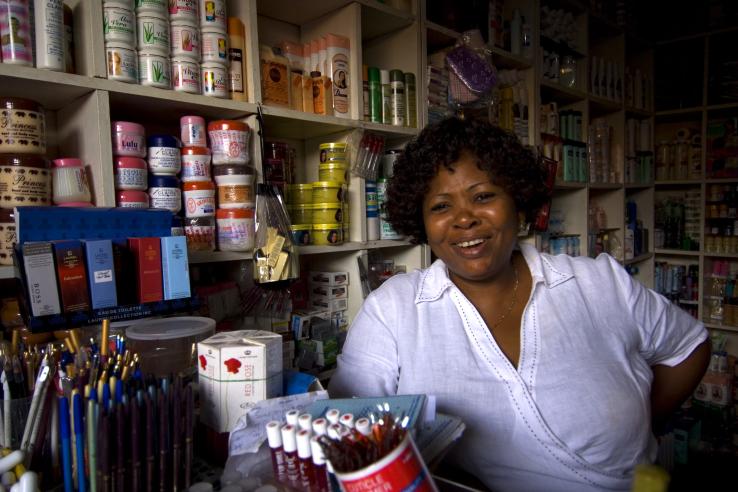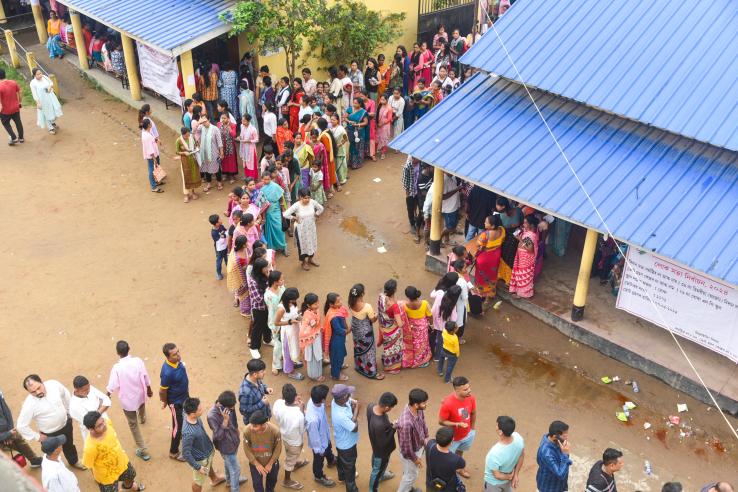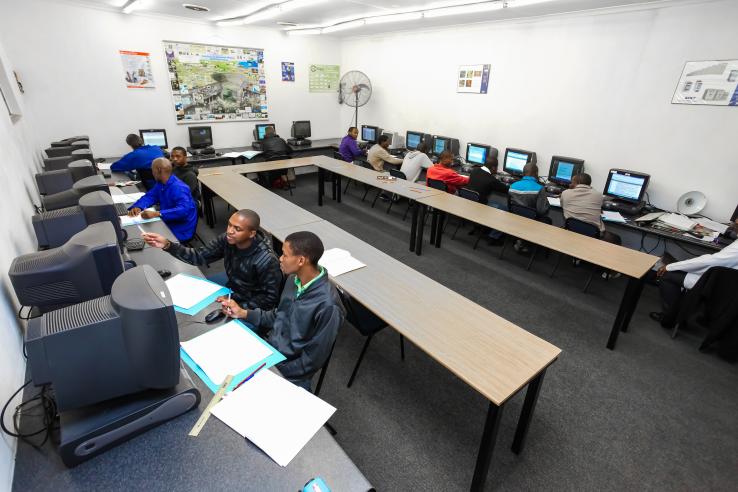Displaying 601 - 615 of 1291
Evaluation
In South Africa, researchers partnered with Harambee Youth Employment Accelerator to evaluate the impact of providing information about a job seeker’s skills on job seekers’ beliefs, search effort, and employment outcomes. Providing information to job seekers and prospective employers increased participants’ employment and earnings. Job seekers updated their beliefs and strategies for job search, and employers received information they valued.
Evaluation
Recent studies have shown that a psychology-based entrepreneurial mindset training can have promising effects on business outcomes. In Ecuador, researchers are evaluating whether these skills can be taught at scale and online by testing the effects of an entrepreneurial mindset training program on youth education and employment outcomes. They are also investigating if and how the effects change when the program is paired with mentoring.
Evaluation
Researchers evaluated the impact of cognitive behavioral therapy (CBT) and cash transfers on functional impairment (or difficulty performing daily tasks), depression, and food security among adults 55 and older living alone in Tamil Nadu, India. At a three-week follow-up, cash transfers improved participants’ reported ability to perform daily tasks and led to a small decline in depression, while neither CBT nor the combination of the two impacted these outcomes.
Evaluation
Researchers evaluated the impact of poverty reduction via an unconditional cash transfer to mothers on child neurodevelopment. Children in families that received a $333 monthly transfer displayed different brain activity patterns than children whose mothers received only $20 a month.
Evaluation
Researchers sent emails to schools posing as parents of students with randomly-varied characteristics to assess if schools responded differently to different types of students. The researchers found that on average both charter and traditional public schools were less likely to respond to students that were signaled as having disabilities, a behavior problem, or low prior academic achievement. The researchers also found that compared to traditional public schools, charter schools were less likely to respond to messages that signal the student has a disability.
Evaluation
Researchers partnered with the government of Uruguay to evaluate the impact of a national youth employment program. The program increased participants’ earnings and school enrollment during and up to two years after the program, suggesting that work-study programs may ease students’ school-to-work transition.
Evaluation
Researchers studied the impact of an in-school program to provide application assistance at schools where fewer than half of high school seniors typically enter college the following year. Application fee waivers combined with an online tool that provided customized college information boosted college application and enrollment rates. A less customized version that includes fee waivers increased application rates but not enrollment, and variations with no fee waivers had negligible or even negative effects on application rates and enrollment.
Evaluation
In low- to middle-income countries around the world, nearly one billion people lived in urban informal settlements as of 2018. Rapid urbanization in most large African cities has led to both more people and a higher proportion of people living in informal settlements over time. Researchers conducted a randomized evaluation to test the impact of winning the housing lottery on the demand for formal government housing, consumption, labor market outcomes, social networks, and community and public goods in Addis Ababa, Ethiopia. Winning the housing lottery increased demand for formal government housing: nearly 46 percent of participant households that win the lottery chose to move into their formal housing, indicating many prefer to live in government housing despite the high implicit cost that they pay to do so.
Evaluation
Those self-employed in microenterprises, who often report low profits and own few assets, account for fifty percent of the labor force in low-income countries. Researchers are conducting a randomized evaluation to test the effect of relieving constraints to microenterprise relocation on business income in Kampala, Uganda.
Evaluation
Researchers tested the impact of a job search planning intervention on job search efficiency and employment among unemployed youth in South Africa. The planning intervention improved participants’ job search intensity and efficiency, leading to higher rates of employment.
Evaluation
Researchers conducted a business plan competition to test whether panel judges or questionnaires answered by firm owners could more accurately identify the fastest growing firms in Ghana. Both survey assessments and judging of business plans through panels selected firms with the potential for faster growth.
Evaluation
Researchers in France studied whether government-provided recruiting services would impact firms’ job postings and hiring by lowering recruiting costs. The recruiting services decreased firms’ hiring costs and increased firms’ job postings and hiring, including much sought-after permanent-contract hires.
Evaluation
Although 20 percent of the population in New Delhi, India live in slums and represent an important voter group for politicians, public service provision in slums remains inadequate. In an ongoing study, researchers evaluated whether providing information to government officials and slum dwellers can lead to higher accountability and improved service delivery.
Evaluation
Access to quality jobs is a pressing concern in sub-Saharan Africa. In Kenya, researchers partnered with the technology company Sama and Innovations for Poverty Action to conduct a randomized evaluation of Sama’s training and job referral programs.
Evaluation
Buyers often have limited information on service quality in low- and middle-income countries. In the absence of information, buyers may receive low quality services or may choose not to seek out service at all, limiting potential benefits for households. Researchers evaluated a program in Pakistan that provided farmers with information on veterinarians’ artificial insemination (AI) success rates and average prices. This led to more successful inseminations without a rise in AI prices.
